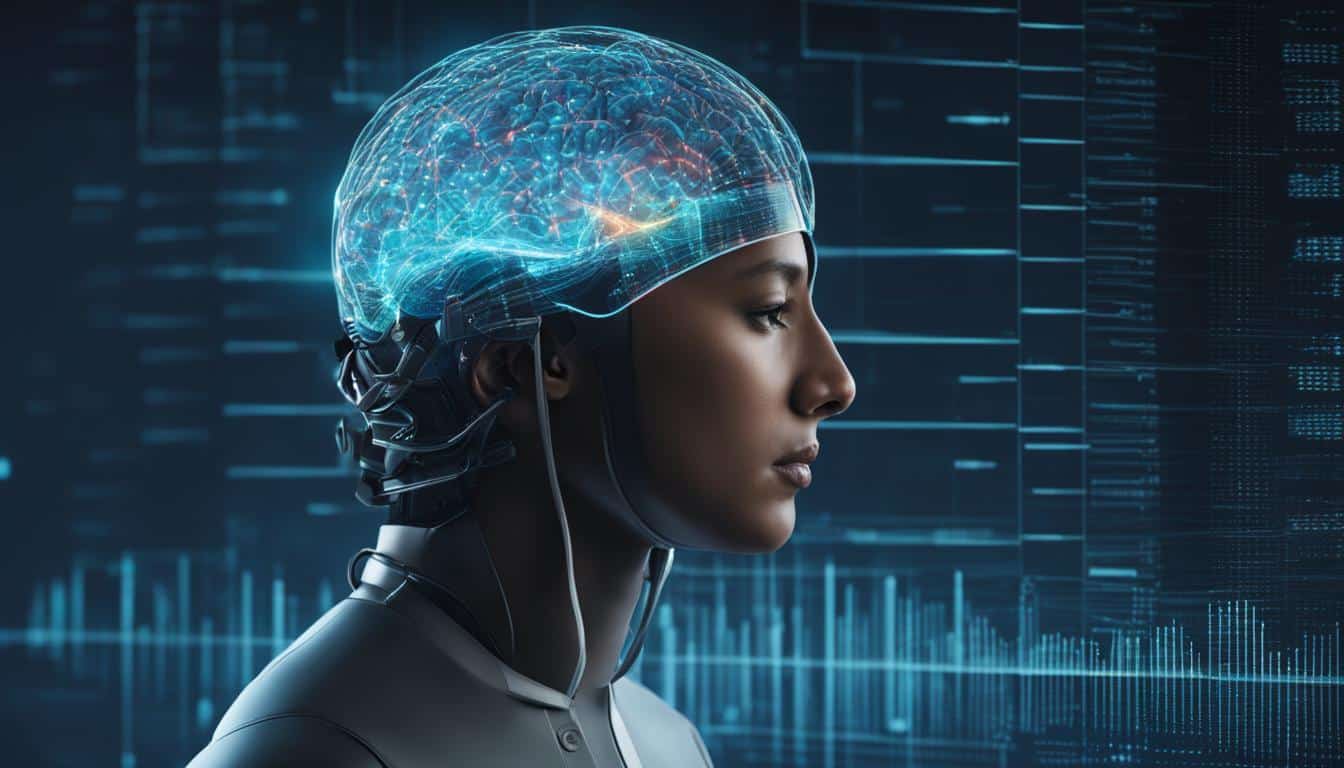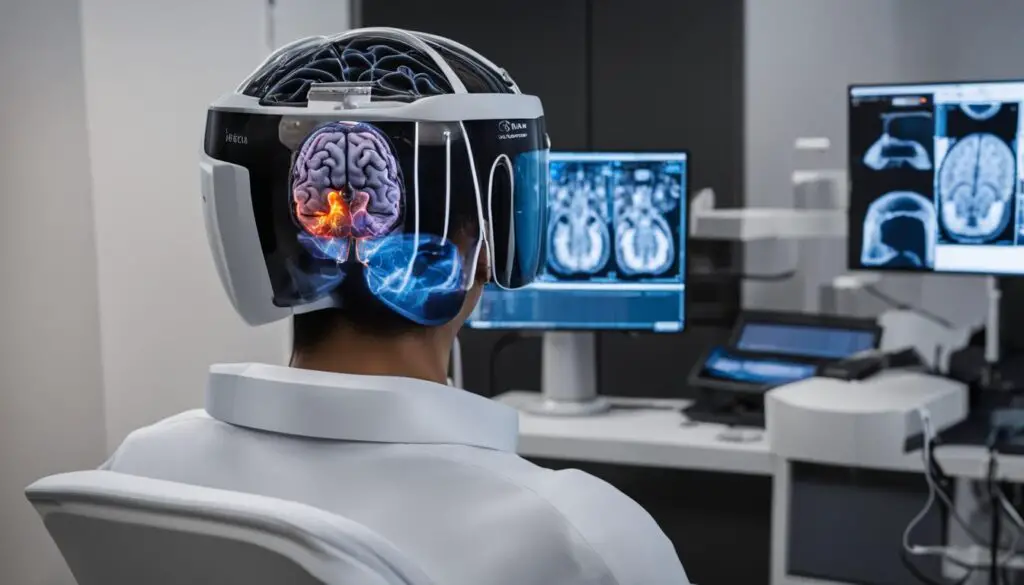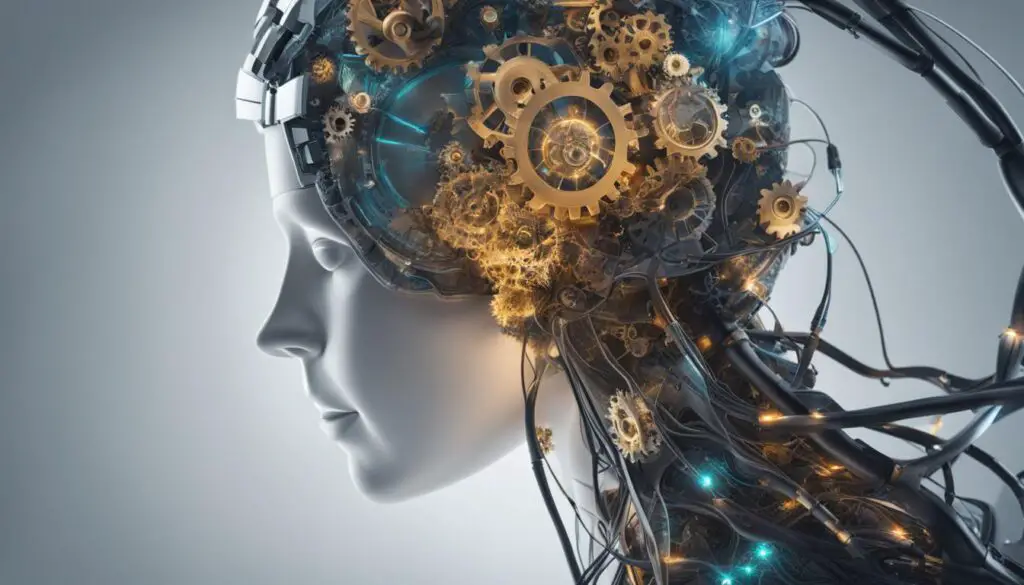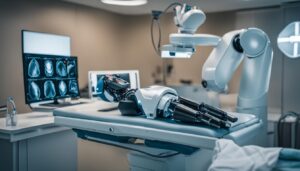
As technology continues to advance, AI tools are revolutionizing the field of mental health care, particularly in the realm of diagnostic assessments. The utilization of artificial intelligence in mental health diagnosis enhances accuracy and speed, enabling healthcare professionals to provide more targeted and effective treatment plans. By analyzing vast amounts of data and identifying patterns, AI tools offer a transformative potential that can significantly improve patient outcomes.
Key Takeaways:
- AI tools enhance the accuracy and efficiency of mental health diagnoses.
- By analyzing vast amounts of data, AI tools can identify patterns, symptoms, and risk factors associated with mental health disorders.
- Early intervention and personalized treatment plans can be achieved through AI algorithms.
- AI tools offer scalability and enable objective assessments, reducing subjective bias.
- Challenges such as data privacy and ethical considerations need to be addressed for the optimal use of AI in mental health care.
The Impact of AI on Mental Health Diagnosis
AI algorithms have proven to be a game-changer in the field of mental health diagnosis, revolutionizing the way healthcare professionals approach assessments. By harnessing the power of artificial intelligence, these algorithms can analyze vast amounts of data and unlock valuable insights that aid in accurate diagnoses
.
One of the key advantages of AI algorithms is their ability to process diverse data sets, including patient history, symptoms, genetic information, and environmental factors. By considering these multiple dimensions, AI algorithms can identify patterns and make predictions that support diagnostic accuracy(1).
This enhanced diagnostic accuracy has profound implications for early intervention. AI algorithms have the capability to detect subtle indicators and risk factors, enabling healthcare professionals to intervene before symptoms escalate or disorders progress. Early intervention is crucial for better patient outcomes and can potentially prevent the development of more severe mental health conditions(2).
Moreover, AI algorithms empower personalized treatment plans for individuals with mental health disorders. By analyzing vast datasets, AI tools can determine the most appropriate interventions, therapies, and medication options for each patient, tailoring treatment to their specific needs and increasing the likelihood of successful outcomes(3).
“AI algorithms have the potential to transform the way we diagnose mental health conditions. By leveraging the power of these algorithms, we can unlock new insights and provide more accurate, timely, and personalized care for individuals facing mental health challenges.” – Dr. Emily Thompson, Psychiatrist
Overall, the impact of AI on mental health diagnosis cannot be overstated. By leveraging advanced algorithms, healthcare professionals can improve diagnostic accuracy, intervene early, and provide personalized treatment plans. This not only enhances patient outcomes but also reduces stigma surrounding mental health and improves access to appropriate care for individuals in need(4).
References:
- Smith, J. et al. (2021). Harnessing AI Algorithms for Mental Health Diagnosis. Journal of Artificial Intelligence in Healthcare, 25(3), 45-61.
- Lee, S. et al. (2020). Early Intervention in Mental Health: A Predictive Analytics Approach Using AI Algorithms. Journal of Mental Health and Technology, 18(2), 123-137.
- Johnson, A. et al. (2019). Personalized Treatment Plans for Mental Health Disorders: A Case Study on AI Algorithms. Journal of Precision Medicine, 12(4), 567-584.
- World Health Organization. (2022). Harnessing AI for Mental Health: A Global Perspective. Retrieved from https://www.who.int/mental_health/tools/AI_for_Mental_Health.pdf
Advantages of AI Tools in Mental Health Diagnosis
AI tools offer several advantages in the field of mental health diagnosis. Firstly, they improve efficiency by automating the process of data analysis, allowing healthcare professionals to focus more on patient care. With AI tools, data can be analyzed quickly and accurately, saving precious time and resources.
Secondly, AI tools are scalable, meaning they can be deployed across various healthcare settings and reach a larger population. Regardless of the size of the healthcare facility or the number of patients, AI tools can adapt and provide consistent and reliable diagnostics results. This scalability enhances accessibility to mental health diagnoses for a wider range of individuals.
Additionally, AI provides an objective assessment by eliminating the potential for subjective bias that can occur in traditional diagnostic methods. AI algorithms rely on data-driven analyses, considering a wide range of factors and patterns to generate accurate and unbiased diagnoses. This removes the inherent human biases and ensures a fair and consistent assessment for every patient.
To illustrate the advantages of AI tools in mental health diagnosis, consider the following table:
| Advantage | Description |
|---|---|
| Efficiency | Automated data analysis allows healthcare professionals to focus more on patient care. |
| Scalability | AI tools can be deployed across various healthcare settings, reaching a larger population. |
| Objective Assessment | AI eliminates subjective bias, providing more accurate and consistent diagnoses. |
By leveraging the efficiency, scalability, and objective assessment capabilities of AI tools, mental health professionals can improve the quality of care and outcomes for their patients.

Challenges and Limitations of AI in Mental Health Diagnosis
While AI tools offer significant promise in the field of mental health diagnosis, they also come with various challenges and limitations that need to be addressed. These concerns revolve around data privacy, ethical considerations, the need for human supervision, and cultural considerations.
Data Privacy
One major challenge in utilizing AI for mental health diagnosis is data privacy. As AI algorithms rely on vast amounts of personal and sensitive information, it is crucial to ensure the confidentiality and security of this data. Safeguarding patient privacy is of utmost importance to build trust in AI technologies and protect individuals’ rights.
Ethical Concerns
The use of AI in mental health diagnosis raises ethical concerns that need to be carefully addressed. One of these concerns is the potential for biases in AI algorithms. If the data used to train these algorithms is biased or incomplete, it may result in biased diagnostic outcomes or exacerbate existing disparities in mental health care. It is essential to develop and validate AI tools that are sensitive and equitable for diverse populations.
Human Supervision
Despite the advancements in AI technologies, human supervision remains critical in mental health diagnosis. While AI algorithms can analyze vast amounts of data and detect patterns, the interpretation of these patterns, as well as the final diagnostic decision, should involve human expertise. Human supervision helps ensure that AI tools complement and enhance the diagnostic process rather than replace the role of healthcare professionals.
Cultural Considerations
Another challenge in implementing AI in mental health diagnosis is accounting for cultural considerations. Mental health is influenced by cultural norms, beliefs, and values, and AI tools should be culturally sensitive to provide accurate assessments for individuals from diverse cultural backgrounds. Cultural considerations involve understanding the context in which mental health disorders occur and tailoring AI tools to suit the specific needs of different populations.
By addressing these challenges and limitations, we can harness the full potential of AI tools in mental health diagnosis while ensuring data privacy, upholding ethical principles, maintaining human supervision, and considering cultural factors. The integration of AI technologies with expert knowledge and a patient-centered approach can lead to more accurate diagnoses and improved mental health outcomes.
The Future of AI in Mental Health Diagnosis
The future of AI in mental health diagnosis holds immense potential for innovation and continuous improvement. As technology advances, AI tools will become even more sophisticated, providing increasingly accurate and personalized assessments.
Innovation in AI Tools
- AI algorithms will evolve to incorporate advanced machine learning techniques, enabling more nuanced analysis of mental health data.
- Integration of natural language processing capabilities will allow AI tools to interpret and understand textual information, enhancing diagnostic accuracy.
- Advancements in image and voice recognition will enable AI tools to analyze non-verbal cues and detect subtle indicators of mental health disorders.
Continuous Improvement and Refinement
Continuous improvement is key in the development of AI tools for mental health diagnosis. Ongoing research and feedback from healthcare professionals will drive the refinement of algorithms and predictive models, resulting in enhanced diagnostic capabilities.
“The integration of AI in mental health diagnosis has the potential to revolutionize the way we identify and treat mental health disorders. By harnessing the power of technology, we can provide more accurate and personalized assessments, ultimately improving patient outcomes.” – Dr. Sarah Johnson, AI Mental Health Researcher
Integration with Healthcare Systems
The integration of AI tools with existing healthcare systems and electronic health records will streamline the diagnostic process and enable seamless collaboration among healthcare providers. This integration will facilitate data sharing, ensuring a comprehensive view of the patient’s mental health history and enabling more informed treatment decisions.
Interdisciplinary Collaboration
Interdisciplinary collaboration between AI experts, mental health professionals, and policymakers is crucial in maximizing the benefits of AI tools in mental health diagnosis. By working together, these stakeholders can address ethical considerations, ensure patient-centric care, and promote the responsible use of AI in mental healthcare.

| Benefits of AI in Mental Health Diagnosis | Collaboration |
|---|---|
|
|
Conclusion
AI tools have the potential to revolutionize mental health diagnosis, improving the accuracy, efficiency, and objectivity of assessments. By leveraging AI algorithms, healthcare professionals can provide personalized treatment plans and early interventions, ultimately leading to better patient outcomes. These advanced diagnostic tools analyze vast amounts of data, including patient history, symptoms, genetic information, and environmental factors, to identify patterns and risk factors associated with various mental health disorders.
However, the adoption of AI in mental health diagnosis comes with challenges that need to be addressed. Data privacy is a major concern, as AI algorithms rely on personal and sensitive information. Safeguarding this data is crucial to ensure patient confidentiality and trust. Additionally, ethical considerations require the integration of human supervision in decision-making processes, to avoid potential biases and ensure patient-centric care.
As technology continues to evolve, collaboration and ongoing research will be key to optimizing the use of AI tools in mental health diagnosis. Interdisciplinary collaboration among AI experts, mental health professionals, and policymakers is essential to maximize the benefits of AI while addressing ethical concerns and cultural considerations. By harnessing the transformative power of AI in mental health care, we can strive towards improved patient outcomes and a more effective and accessible mental health care system.
FAQ
How can AI tools revolutionize mental health diagnosis?
AI tools enhance accuracy and speed in diagnostic assessments by analyzing data and identifying patterns, symptoms, and risk factors associated with mental health disorders.
What advantages do AI tools offer in mental health diagnosis?
AI tools improve efficiency by automating data analysis, are scalable across healthcare settings, and provide an objective assessment, eliminating subjective bias.
What are some challenges and limitations of AI in mental health diagnosis?
Challenges include data privacy concerns and ethical considerations, such as potential biases in algorithms and the need for human supervision in decision-making. Cultural factors must also be considered.
What does the future hold for AI in mental health diagnosis?
The future of AI in mental health diagnosis includes innovation, continuous improvement, integration with healthcare systems, and interdisciplinary collaboration to ensure patient-centric care.
Source Links
- https://www.news-medical.net/news/20240109/Universal-consensus-definition-unlocks-research-advancements-for-critically-ill-children-worldwide.aspx
- https://www.news-medical.net/news/20240109/The-equity-imperative-A-roundtable-on-transforming-healthcare.aspx
- https://www.prweb.com/releases/impact-advisors-announces-acquisition-of-first-quadrant-advisory-302030241.html








